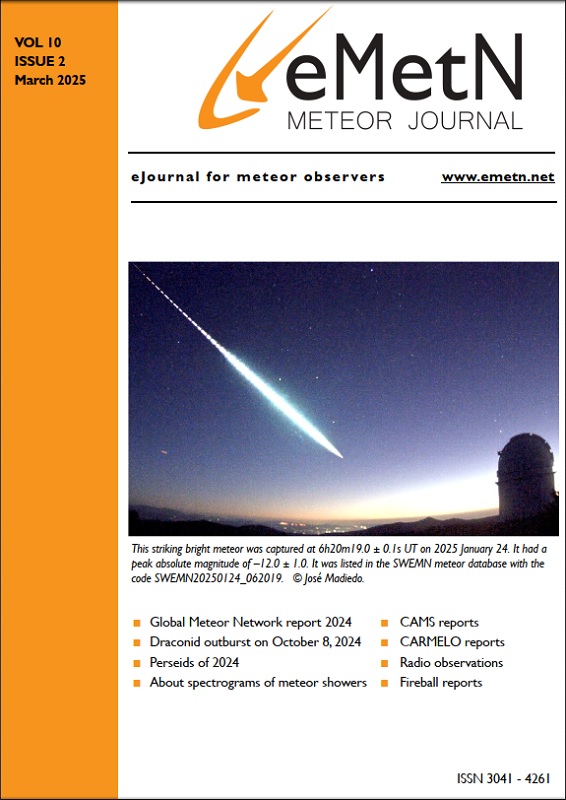On Friday, August 16th, 2019, at 22:36:02 CEST (20:36:02 UTC) a huge fireball was observed from all around the west Mediterranean Sea.
Numerous people from Spain, Italy and France witnessed this event as reported on the IMO website form.
On social media networks, Algeria citizens from Batna, Biskra, Sétif, Constantine and Alger described their amazing sighting.
But most of the witnesses are located at the islands Sardinia and Corsica where the fireball enlightened the ground.

Figure 1 – The ground path of the fireball of 2019/08/16, 20h36m02s UTC according to 93 reports on 3790-2019 event IMO page.
The object crossed the field of the DSLR camera of Francesco Malica when he made tests for startrail pictures at S’Archittu.
Also a driver at Sardinia, Claudio P. was on the Stella Maris road at Oristano when he caught the fireball with his dashcam.
[youtube https://www.youtube.com/watch?v=xqmo6RqxqRs&w=560&h=315]
Somewhere on the west coast of Sardinia, the fireball streaked across the sky during a country dance music performance.
Video source : Facebook Casteddu Online – Cagliari Online
This superbolide was so bright that it was spotted by video meteor camera located from Ibiza until the Puig des Molins observatory, 600 km away from Sardinia.
The Spanish Meteor and Fireball Network (SPMN) operating this station evaluated the luminosity to magnitude -16.

Figure 2 – 20190816_203602 fireball caught by the AAE observatory at Ibiza/Spain
Using videos and pictures recorded, the location of the atmospheric entry of the meteor can be found.
The azimuths and elevations are derived from the records of Francesco Malica/S’Archittu, Claudio P./Oristano, AAE observatory/Ibiza and on a fourth picture from the meteo webcam at Asuni.

Figure 3 – 20190816_203602 Fireball recorded by the weather camera of the city of Asuni/Sardinia
Table 1- The positional data for the four locations.
| Observer | Location | Latitude (°) | Longitude (°) | Altitude (m) | Azimuth (°) | Elevation (°) | Comment |
| AAE Observatory | Ibiza | 38.9060 | 1.4292 | 42 | 90° | – | First big burst |
| Francesco Malica | S’Archittu | 40.0906 | 8.4934 | 20 | 225° | 13° | First big burst |
| Claudio P. at 22:43:32 | Oristano | 39.9109 | 8.5305 | 2 | 229° | – | First big burst |
| Modighina webcam | Asuni | 39.8872 | 8.9741 | 600 | 243° | 15° | – |

Figure 4 – 20190816 fireball coordinates assessment on 4 records
The first big burst location could be determined with a sufficient accuracy on the direction from the pictures of Francesco Malica and Claudio P. as well as with a less good accuracy from AAE observatory footage.
We can compare the locations derived from these pictures and the trajectory found from the visual reports of the IMO, the meteor passed 100 km west of the coast of the island Sardinia, heading South but a hundred kilometres SSW of the trajectory calculated by the IMO.

Figure 5 – estimated location of the first big burst of the 20190816 fireball
According to the CNEOS/NASA/JPL report from the U.S. Government space sensors, the velocity of the asteroid was 14.9km/s at it’s maximum bright position lat : 38.9°N , long : 7.0E , altitude : 36km
They calculated an impact energy close to 0.9 kt

Figure 6 – 20190816_203602 fireball report map – https://cneos.jpl.nasa.gov/fireballs/

